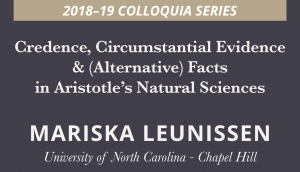Presented By: Department of Philosophy
Ancient Philosophy: Mariska Leunissen (UNC Chapel Hill)
Credence, Circumstantial Evidence, and (Alternative) Facts in Aristotle's Natural Sciences

For Aristotle, every scientific investigation starts with the collection and organization of facts: only once we have established the 'hotis' - the 'thats' - of any given scientific domain, we can then proceed to investigate their causes and provide explanations or demonstrations of those facts. The fact collecting stage in Aristotle's natural sciences is thoroughly empirical: Aristotle stresses the importance of acquiring observational experience, of observing phenomena for the sake of knowledge, and of giving credence to observations over theory in cases where the facts have not yet been sufficiently grasped. My aim in this paper is to reconstruct and critically discuss (1) Aristotle's strategies for establishing facts in his natural sciences in those cases where observations are altogether lacking or insufficient to determine with any certainty whether the facts are such or so (e.g. 'whether the universe is spherical or lentil-shaped' in his cosmology, or 'whether the gestation period of elephants is one years or two years long' in his biology) and (2) also his strategies for evaluating putative empirical facts as reported by others in those cases where Aristotle would not have been able to verify those facts himself through observation. I will argue that in empirically underdetermined domains, Aristotle's epistemic goal in establishing facts is not knowledge but credence, and that he relies heavily on circumstantial empirical evidence; on arguments based on 'what can reasonably be expected to be the case', given observations of other, related phenomena; and on ingenious methods of 'weighing' the evidential force of competing sets of inconclusive observations in an attempt to establish and evaluate natural facts in a scientific way.